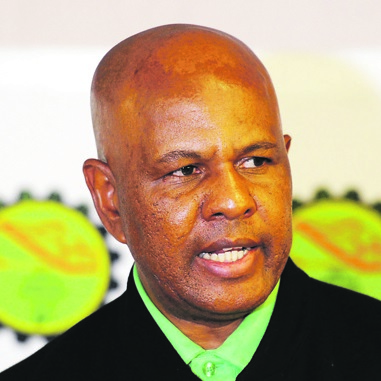
The standoff between Sibanye Stillwater and the Association of Mineworkers and Construction Union (Amcu) appears nowhere near to being resolved – and the looming secondary strike at the mine’s platinum operations in Rustenburg may have a devastating knock-on effect on investor sentiment rather than on immediate economic performance.
On Friday, Sibanye applied for an interdict to stop the secondary strike. Amcu members in Sibanye’s gold operations in Beatrix, Kloof and Driefontein downed tools in November over wage demands.
Earlier this month, the union also delivered notice of its intention to embark on a secondary strike in support of the current industrial action.
Late last year, Sibanye signed a wage deal with the National Union of Mineworkers (NUM), the United Association of SA (Uasa) and Solidarity that offered increases of R700 a month in the first and second years, and R825 a month in the third year to some categories of employees.
Amcu wants a R1 000 annual hike over three years.
According to Amcu president Joseph Mathunjwa, the current strike at Sibanye’s gold operations will continue, with the secondary strike scheduled to begin in the platinum sector on Tuesday.
Mathunjwa denied that the union walked out of the verification process conducted by the Commission for Conciliation, Mediation and Arbitration (CCMA) this week, saying Amcu members would not participate, pending the union’s appeal of a Labour Court decision, taken in December.
In that judgment, the Labour Court ordered the CCMA to facilitate an independent membership verification process to determine which union, between Amcu and the NUM, held the majority at Sibanye.
According to Sibanye spokesperson James Wellsted, Amcu staged a walkout from the CCMA verification process earlier this week.
Wellsted said the company was confident that the three unions which had signed the wage offer represent more than 50% of the workers and that Amcu was simply attempting to delay the conclusion of the strike.
“We will oppose Amcu’s attempts to avoid this necessary verification process. We are not surprised by Amcu’s behaviour and we have considered other legal alternatives, which we will now pursue,” he said.
By law, the agreement of the majority representatives with the employer binds the minority.
“We are appealing a portion of the labour court judgment because [it limits] of the scope of verification from November 23 to December 13,” said Mathunjwa.
“If those dates are used, it excludes all the debits that we have been asking the company to do from earlier in the year which the company has been neglecting. We have been complaining to Sibanye to update and process our members, but it has not. We even had meetings in October.”
Mathunjwa said the union had already served notice for a secondary strike in the platinum sector. Wellsted said most of Amcu’s members are in the platinum sector and at Sibanye’s platinum operations.
Mathunjwa said the union has about 15 000 platinum sector members and 12 700 members at Sibanye’s gold operations alone.
According to Wellsted, before the strike started, Amcu and the NUM had 43% membership apiece, but the NUM had since gained more members.
However, the picture is different in Sibanye’s platinum operations, where Amcu boasts a majority of 71% membership among the workforce.
The NUM said that in September it had 14 259 members, while Amcu had 14 165 members in the gold sector, meaning that no union had an outright majority.
COLLUSION AND VIOLENCE
Mathunjwa said there was a concerted effort by the company and the NUM to portray Amcu as a trouble-making, violent union and that, so far, only one-sided narratives had been told to the public.
“Sibanye and the NUM are colluding to portray Amcu as the bad instigators here,” he said.
Since the strike started, there have been reports of at least 15 houses belonging to NUM members being burnt in Blybank, near Sibanye’s Driefontien mine in Carletonville. Two people were injured as a result of fires in Beatrix.
Mathunjwa denied that those incidents had anything to do with Amcu, saying there was already infighting in the NUM before the strike started.
“The NUM is trying to blame Amcu for their own internal problems. Recently, the NUM at South Deep were fighting among themselves. Those incidents may be their own internal fights. A day before the strike began, one of our members was shot and stabbed – in front of Sibanye security and cameras – by a member of the NUM at Kloof; nothing has been done about it to this day,” he said, adding that Sibanye also gave preferential treatment to the NUM when booking for union meetings on the mine’s premises.
Mathunjwa said two Amcu members had died since the start of the strike and 82 more members had been arrested, allegedly for picketing, and banned from the hostel. The union has since had to dip into its coffers to provide accommodation for the members.
Wellsted said the locking out of the 82 miners was a bail condition that the company had complied with. He denied there was any collusion between the mine and the NUM.
NUM spokesperson Livhuwani Mammburu dismissed Mathunjwa’s allegations.
“Mathunjwa is a pathological liar. That violence started on the day of the strike. The South Deep incident was infighting, but that has been resolved and has nothing to do with Sibanye,” he said.
SECONDARY STRIKE
According to Patrick Mathidi, head of equities at Aluwani Capital, the looming secondary strike may have a marginal effect initially as the immediate effect will be felt by the workers.
“From an investment point, our miners have shrunk in size, and the impact is largely going to be marginal. The biggest impact will be on investor sentiment, contributing to the narrative that South Africa is a very difficult place to do business.”
Mining and labour analyst Mamokgethi Molopyane said the strike had the potential to spill over to Sibanye’s platinum operations.
“The clash between Sibanye and Amcu is not new, but Amcu is the biggest union in platinum, so it may want to use its muscle in that sector. The company must take care when dealing with the current strike because the gold strike could spill over to its platinum operations and become more than a secondary strike, and Sibanye will have its operation in both sectors coming to a standstill,” he said.
The clash between Amcu and Sibanye is unlikely to end soon as the company’s bid to buy Lonmin in the platinum sector recently got the green light, despite heavy opposition from Amcu – signalling more clashes ahead between the two.




 Publications
Publications
 Partners
Partners









